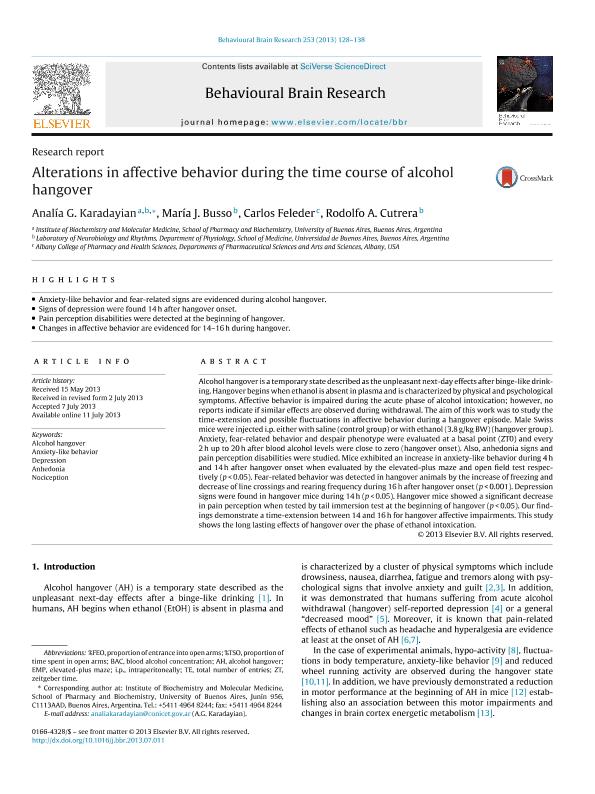Mostrar el registro sencillo del ítem
dc.contributor.author
Karadayian, Analia Graciela

dc.contributor.author
Busso, María Julia

dc.contributor.author
Feleder, Carlos Alberto

dc.contributor.author
Cutrera, Rodolfo Angel

dc.date.available
2019-09-27T22:03:56Z
dc.date.issued
2013-09
dc.identifier.citation
Karadayian, Analia Graciela; Busso, María Julia; Feleder, Carlos Alberto; Cutrera, Rodolfo Angel; Alterations in affective behavior during the time course of alcohol hangover; Elsevier Science; Behavioural Brain Research; 253; 9-2013; 128-138
dc.identifier.issn
0166-4328
dc.identifier.uri
http://hdl.handle.net/11336/84743
dc.description.abstract
Alcohol hangover is a temporary state described as the unpleasant next-day effects after binge-like drinking. Hangover begins when ethanol is absent in plasma and is characterized by physical and psychological symptoms. Affective behavior is impaired during the acute phase of alcohol intoxication; however, no reports indicate if similar effects are observed during withdrawal. The aim of this work was to study the time-extension and possible fluctuations in affective behavior during a hangover episode. Male Swiss mice were injected i.p. either with saline (control group) or with ethanol (3.8. g/kg BW) (hangover group). Anxiety, fear-related behavior and despair phenotype were evaluated at a basal point (ZT0) and every 2. h up to 20. h after blood alcohol levels were close to zero (hangover onset). Also, anhedonia signs and pain perception disabilities were studied. Mice exhibited an increase in anxiety-like behavior during 4. h and 14. h after hangover onset when evaluated by the elevated-plus maze and open field test respectively (p<. 0.05). Fear-related behavior was detected in hangover animals by the increase of freezing and decrease of line crossings and rearing frequency during 16. h after hangover onset (p<. 0.001). Depression signs were found in hangover mice during 14. h (p<. 0.05). Hangover mice showed a significant decrease in pain perception when tested by tail immersion test at the beginning of hangover (p<. 0.05). Our findings demonstrate a time-extension between 14 and 16. h for hangover affective impairments. This study shows the long lasting effects of hangover over the phase of ethanol intoxication. © 2013 Elsevier B.V.
dc.format
application/pdf
dc.language.iso
eng
dc.publisher
Elsevier Science

dc.rights
info:eu-repo/semantics/openAccess
dc.rights.uri
https://creativecommons.org/licenses/by-nc-nd/2.5/ar/
dc.subject
ALCOHOL HANGOVER
dc.subject
ANHEDONIA
dc.subject
ANXIETY-LIKE BEHAVIOR
dc.subject
DEPRESSION
dc.subject
NOCICEPTION
dc.subject.classification
Otras Ciencias de la Salud

dc.subject.classification
Ciencias de la Salud

dc.subject.classification
CIENCIAS MÉDICAS Y DE LA SALUD

dc.title
Alterations in affective behavior during the time course of alcohol hangover
dc.type
info:eu-repo/semantics/article
dc.type
info:ar-repo/semantics/artículo
dc.type
info:eu-repo/semantics/publishedVersion
dc.date.updated
2019-09-27T21:02:48Z
dc.journal.volume
253
dc.journal.pagination
128-138
dc.journal.pais
Países Bajos

dc.journal.ciudad
Amsterdam
dc.description.fil
Fil: Karadayian, Analia Graciela. Consejo Nacional de Investigaciones Científicas y Técnicas. Oficina de Coordinación Administrativa Houssay. Instituto de Bioquímica y Medicina Molecular. Universidad de Buenos Aires. Facultad Medicina. Instituto de Bioquímica y Medicina Molecular; Argentina
dc.description.fil
Fil: Busso, María Julia. Universidad de Buenos Aires. Facultad de Medicina. Departamento de Ciencias Fisiológicas; Argentina
dc.description.fil
Fil: Feleder, Carlos Alberto. The Albany Medical College; Estados Unidos
dc.description.fil
Fil: Cutrera, Rodolfo Angel. Universidad de Buenos Aires. Facultad de Medicina. Departamento de Ciencias Fisiológicas; Argentina
dc.journal.title
Behavioural Brain Research

dc.relation.alternativeid
info:eu-repo/semantics/altIdentifier/doi/http://dx.doi.org/10.1016/j.bbr.2013.07.011
dc.relation.alternativeid
info:eu-repo/semantics/altIdentifier/url/https://www.sciencedirect.com/science/article/pii/S0166432813004105
Archivos asociados
